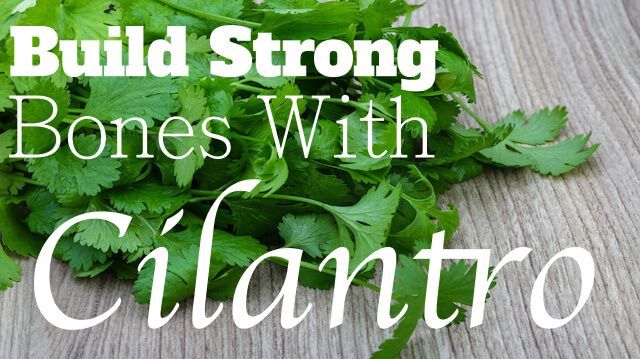
Vibrantly green and undeniably fresh, cilantro is a herb that packs a powerful punch both in flavor and in health benefits. Whether you prefer it in Thai food, fresh salsa, or another way altogether, cilantro should be a regular part of your diet. It’s detoxifying and an antioxidant, lowers anxiety, strengthens bones, and provides several other benefits that make it a great food to integrate into your meals.
Promote oral health
The mouth is the perfect environment for bacteria and fungus to grow. It’s warm, wet and dark — essentially the best place for harmful organisms to take up residence. Candida albicans, a form of yeast, is one such organism. It can have vastly negative effects on your overall health, but chomping on cilantro may help prevent its growth. Studies have shown that cilantro may act as an antifungal agent, destroying Candida albicans when ingested. Calcium levels in cilantro also help to maintain the integrity of our teeth. Add cilantro to roasted acorn squash for a delicious savory experience.
Strengthen bones
Green leafy vegetables are a great source of vitamin K, which is essential for the body to produce osteocalcin, a main component of the matrix of skeletal tissue. More than half of our daily requirement of vitamin K is contained in just half a cup of chopped cilantro. So if you love cilantro, pile it on your favorite vegetable stir fry or mix up a fresh batch of pico de gallo to enjoy a flavorful boost that’s also beneficial to your bones.
Detox from heavy metals
Heavy metals can accumulate in the body through everyday activities and exposure to harmful environmental factors. Coriandrum sativum — the scientific term for coriander and its leaves, also known as cilantro — has shown to significantly protect against oxidative stress brought on by lead exposure.
Likewise, there’s scientific evidence that cilantro can help detox patients who have large levels of mercury in their blood. When you eat cilantro, its compounds bond with heavy metals in your system and help the body naturally eliminate them, leading to overall improved health.
Lower anxiety
Fresh cilantro gives dishes a bright taste, but noshing on some of this herb may help reduce your anxiety levels too. A study published in the Indian Journal of Pharmacology found that extract of Coriandrum sativum had similar, positive results on anxiety to those of diazepam, a common anti-anxiety medication. Try substituting cilantro for basil the next time you make a batch of homemade pesto for a flavor that will pique your interest and soothe your mood.
Protect your heart
According to the American Heart Association, potassium consumed from natural sources can help control blood pressure as it reduces the effects sodium has on blood pressure. In addition to lowering your sodium intake and adopting healthy eating habits, cilantro can help mellow your blood pressure. Try combining it with organic or dairy-free sour cream instead of chives the next time you bake an organic potato.
Stimulate immunity
Not only can fragrant herbs like cilantro help you reduce the amount of table salt you add to food — thereby taking a step toward better heart health — it may also help the body battle cancer. The National Cancer Institute has identified a number of common herbs that have cancer-preventative characteristics. Among the herbs in the Umbelliferae (carrot) family is cilantro and its seed form, coriander. Cilantro may work to stimulate immunity, inhibit actions of the metabolic system associated with cancer development, and may help to detoxify the body of pre-cancerous cells.
Lower blood sugar levels
Cilantro contains a number of valuable bioactive elements including flavonoids, steroids and tannins. Research published in the Journal of Food Science suggests that these compounds may help lower blood sugar levels in diabetic individuals. When compared to a readily available drug, extract of cilantro was shown to lower levels of triglycerides and cholesterol, while providing protection from free radicals. Scientists are taking notice: Cilantro may help hypoglycemic and diabetic patients control their blood sugar.
 Find relief for digestive issues
Find relief for digestive issues
Cilantro and coriander have been used in natural medicine as a digestive remedy for a number of conditions including constipation, intestinal gas and stomach upset. There’s even some evidence that, when taken with spearmint and lemon balm, coriander may help relieve the painful symptoms of irritable bowel syndrome.
In addition, cilantro may help protect us from food poisoning. In much the same way that cilantro bonds with metals to escort them out of the body, there’s evidence that cilantro has the same effect on toxins in spoiled food.
Protect against colon cancer
It appears that another benefit of consuming cilantro is protection against colon cancer. The Journal of Ethnopharmacology published a study that not only showed decreased concentrations of cholesterol in subjects, but also evidence of cilantro’s positive effect on fat metabolism. Together these protective properties mean that cilantro may offer protection against colon cancer, and an examination of test subjects supports the hypothesis.
For a new way to easily add cilantro to your diet and reap its cancer protective benefits, try adding fresh chopped cilantro to your favorite salad mix. The bright taste is perfect for warmer months.
Whether you appreciate the fresh flavor of cilantro sprinkled on tofu curry, or you’ve never used it before, cilantro’s health benefits make it a herb worth adding to your diet. Try sprinkling it on potatoes, freshly caught fish, or lentils. What’s your favorite way to integrate cilantro into recipes?
—The Alternative Daily
Sources:
http://www.ncbi.nlm.nih.gov/pubmed/19902160
http://www.ncbi.nlm.nih.gov/pubmed/8686573
http://www.ncbi.nlm.nih.gov/pubmed/22022003
http://www.heart.org/HEARTORG/Conditions/HighBloodPressure/PreventionTreatmentofHighBloodPressure/Potassium-and-High-Blood-Pressure_UCM_303243_Article.jsp
http://ajcn.nutrition.org/content/70/3/491s.full
http://www.ncbi.nlm.nih.gov/pubmed/22301773
http://www.ncbi.nlm.nih.gov/pubmed/22671941
http://www.webmd.com/vitamins-supplements/ingredientmono-117-CORIANDER.aspx?activeIngredientId=117&activeIngredientName=CORIANDER&source=2
http://www.ncbi.nlm.nih.gov/pubmed/10940583
http://www.ncbi.nlm.nih.gov/pubmed/21660258
The Encyclopedia of Natural Medicine, 3rd edition. Michael T. Murray, N.D. & Joseph Pizzorno, N.D.
The Encyclopedia of Healing Foods. Michael Murray, N.D. & Joseph Pizzorno, N.D., with Lara Pizzorno, M.A., L.M.

